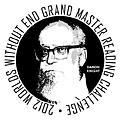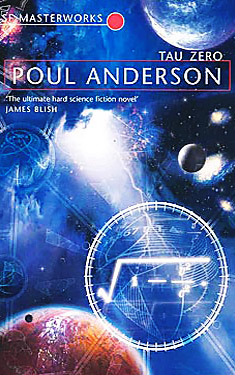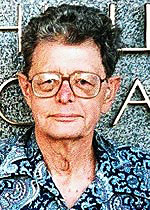GMRC Review: Tau Zero by Poul Anderson
 Guest Blogger and WWEnd member, valashain, reviews science fiction and fantasy books on his blog Val’s Random Comments which we featured in a previous post: Five SF/F Book Blogs Worth Reading. Val has posted many great reviews to WWEnd and this is his first for the GMRC. Be sure to visit his site and let him know you found him here.
Guest Blogger and WWEnd member, valashain, reviews science fiction and fantasy books on his blog Val’s Random Comments which we featured in a previous post: Five SF/F Book Blogs Worth Reading. Val has posted many great reviews to WWEnd and this is his first for the GMRC. Be sure to visit his site and let him know you found him here.
Note: There be spoilers here!
 I decided to sign up for the 2012 Grand Master Reading Challenge, organized by World Without End. The goal is to read and review a work by a different Damon Knight Memorial Grand Master Award winner every month. I decided to start with Poul Anderson, who was honoured with the award in 1998. Tau Zero (1970) is one of his better known works. It was nominated for the Hugo Award in 1971 but lost to Larry Niven‘s Ringworld. It is a very good example of hard science fiction, written in a time when the direction of the genre was being drastically changed by the arrival of new age authors. The novel is an expansion of the short story To Outlive Eternity which was first published in Galaxy Science Fiction in 1967. I’m not going to hold back on spoilers in this review, the title of the short story gives is one already anyway. You have been warned.
I decided to sign up for the 2012 Grand Master Reading Challenge, organized by World Without End. The goal is to read and review a work by a different Damon Knight Memorial Grand Master Award winner every month. I decided to start with Poul Anderson, who was honoured with the award in 1998. Tau Zero (1970) is one of his better known works. It was nominated for the Hugo Award in 1971 but lost to Larry Niven‘s Ringworld. It is a very good example of hard science fiction, written in a time when the direction of the genre was being drastically changed by the arrival of new age authors. The novel is an expansion of the short story To Outlive Eternity which was first published in Galaxy Science Fiction in 1967. I’m not going to hold back on spoilers in this review, the title of the short story gives is one already anyway. You have been warned.
Fifty men and women are sent on the spaceship Leonora Christine to explore and, if possible, colonize a planet more than thirty light years away. To make the trip in a reasonable span of time, the spaceship has to approach the speed of light and make use of the time dilation effects that become appreciable at such speeds. Before deceleration can be set in, the engines needed to slow down the ship are severely damaged. Repairing them would mean shutting the acceleration engines off as well, which would result in a quick death from intense radiation. The ship’s speeds keeps increasing, hurling the crew ever faster through space and time. Unless they can find a way to slow down the crew is doomed to live out their life on board the space ship.
Tau Zero is science fiction so hard it cuts diamonds. A physics lesson and a novel rolled into one. The publisher kindly provided the formula for the time contraction factor Tau, which equals the square root of 1 minus v squared divided c squared, where v stand for velocity and the constant c is the speed of light. In other words Tau equals zero when v equals c (everybody still with me?). In a more practical sense, the closer the speed of the ship gets to the speed of light, the larger the difference between time passing for the crew and time passing outside the ship. I understand that Anderson’s use of Tau is a bit unorthodox but for narrative purposes it serves very well.
In a way, Anderson uses Tau to show us just how large the universe really is, something he is rather fond of doing in his other science fiction novels as well. As the velocity of the ship approaches the speed of light, minutes, hours, days, years and eventually aeons pass for every second of ship time. Galaxies are crossed, then clusters and super clusters to the point where time and distance becomes meaningless. In the end, Anderson takes us to the death of the universe itself and there a bit of speculation seeps in. The debate about the eventual fate of the universe is still raging, Anderson assumes the universe is cyclic and will eventually contract into a new singularity and expand again after a big bang. Although science has not come up with the proof for this yet, in literature the death and rebirth of the universe does make for a wonderful theme.
That’s quite a lot of physics and cosmology for the reader to take in. The more experience science fiction reader will have come across these elements before. Alastair Reynolds for instance, includes much more exotic science into his works. Anderson explains the physics clearly, even the more counter intuitive elements of relativity, but spares us quantum mechanics. Personally, I enjoyed the scientific passages a lot. That is my personal taste however; it will no doubt put some readers to sleep in a few pages. This novel requires some interest in physics and cosmology to really appreciate.
One might think that this would be enough science for a single novel but Anderson also throws in quite a lot of detail about the Bussard engine of the spaceship. This theoretical way of propelling a ship was first proposed in 1960 and has appeared in a number of science fiction novels by such authors as Larry Niven and Carl Sagan. It is basically a fusion engine which uses the minute quantities of free hydrogen in space to propel the ship. There has been a lot of debate about whether or not a ship powered in such a way would actually be able to reach relativistic speeds, but it’s an ingenious idea anyway. Again Anderson explains the design of the engine and its limitations, which play a large part in the efforts to slow the ship down, very clearly. I thought the engineering was a bit less interesting than the cosmology but it is central to the plot and Anderson makes sure not to overdo it.
 Hard science fiction has a reputation of paying less attention to character and character development. For Tau Zero that is definitely true. I guess you could consider the two people we meet in the opening chapter, the compassionate Ingrid Lindgren and the brusque Charles Reymont to be the main characters. They appear to be the people who keep the crew together and sane as Earth becomes an ever more distant memory. They are mostly people dealing with problems of the crew’s morale and organizing efforts to solve their technical problems. Although towards the end of the book things get a bit more philosophical (the death and rebirth theme does have an effect on them), there is very little in the way of development in their characters.
Hard science fiction has a reputation of paying less attention to character and character development. For Tau Zero that is definitely true. I guess you could consider the two people we meet in the opening chapter, the compassionate Ingrid Lindgren and the brusque Charles Reymont to be the main characters. They appear to be the people who keep the crew together and sane as Earth becomes an ever more distant memory. They are mostly people dealing with problems of the crew’s morale and organizing efforts to solve their technical problems. Although towards the end of the book things get a bit more philosophical (the death and rebirth theme does have an effect on them), there is very little in the way of development in their characters.
Most of the novel is set in space so the future history of Earth is not all that important. We do get a glimpse of a society where Sweden has become the centre of power in the world after a nuclear war that almost doomed the planet. IKEA everywhere, surely this must count as a dystopia. Anderson, American of Danish descent, also weaves in some reverences to Scandinavian mythology, something that returns in many of his novel. It’s a bit of an odd contrast really, the cyclic nature of the universe as described in this novel, reminded me more of Hindu mythology.
According to the blurb on the cover, James Blish considers this book the ultimate hard science fiction novel. There is something to be said for that. I have rarely read a novel with such rigorous scientific underpinnings. Anderson had a degree in physics and in other novels it is quite clear that he thought about the properties of fictional planets he created. In Tau Zero he takes it way beyond that and makes physics the main character. The scope of the novel, in time and space is almost beyond comprehension (something the author points out several times in the text). Anderson takes hard science fiction as far as it will go; in that sense it is the ultimate novel in this particular sub-genre. That being said, it does not escape the shortcomings generally associated with the sub-genre. I’d say it is a must read for fans of hard science fiction only.



















 Full Details
Full Details


6 Comments
Thanks for the review Val, and gratz on getting on the board with the reading challenge! This is one I’ve had on and off of my reading list for a while now, indecisive about it, but after reading your review I know how to approach it.
Thanks for the review. I’ve long been curious about this novel and hope to get to it this year. Anderson seems like a writer who was always near the top of the field during his long career, but isn’t discussed much today. (Or am I wrong about that?) He was extremely prolific, but never produced that single "career-defining" novel that would give modern readers an obvious place to start. And he’s hard to define as a writer, having written everything from the hardest of hard SF (as described here) to wonderful fantasies like Three Hearts and Three Lions and The High Crusade. For anyone interested in Anderson, Baen recently finished publishing a series of seven omnibus volumes that brings together his complete "Technic Civilization" future history saga, consisting of over a dozen novels and numerous shorter works written between 1950 and 1985. This amazing body of work has always been hard to get a handle on, since the stories were not written and published in chronological order, or ever presented as a numbered series (until now). Hopefully this will help maintain interest in Poul Anderson, who certainly deserves the Grand Master standing. (If you go looking for this series, which starts with The Van Rijn Method, don’t be put off by the horrendous covers!)
@Mattastrophic: Thanks, I must admit I had my doubts when I started it but Anderson makes the most of a very strong concept.@Scott Laz: I have read the seven volumes of Technic Civilization material Baen published recently (reviews on my blog if anyone’s interested). It had it’s up and downs, the early Flandry stories in particular were of dubious quality, but overall I enjoyed them a lot. I’m amazed Anderson managed to get the timeline more or less consistent with so many stories and novels set in the same universe.
@Val. I’ll check out your review. I’ve read bits and pieces over the years, but have waited for the series to complete publication before diving in from the beginning. Paul Di Filippo gives the series a positive review in the new (March) issue of Asimov’s…
This book has been on my reading list on and off. It is truly a daunting task deciding on which book to start with when a writer was so prolific. @Scott’s sentiment is quite valid about that one defining book. "Tau Zero" seems to the closest to that as it appears on many of the floating lists out there. And so does some his fantasy. Reading this review, "Tau Zero" sounds like something that I will enjoy. I guess it’s about high time that I tackle this novel.
Tau Zero is a fantastic book, but the scientific authenticity is overrated. Ram-based starships do not approach the speed of light because the matter entering the ram collector is nearly at rest. Conservation of momentum means that the starship will reach an equilibrium between its thrust force and the reduction in its momentum caused by taking "fuel" that is nearly at rest. The book has an awesome narrative, but faulty science because it neglects the realistic limit on velocity.
Sorry, the comment form is closed at this time.